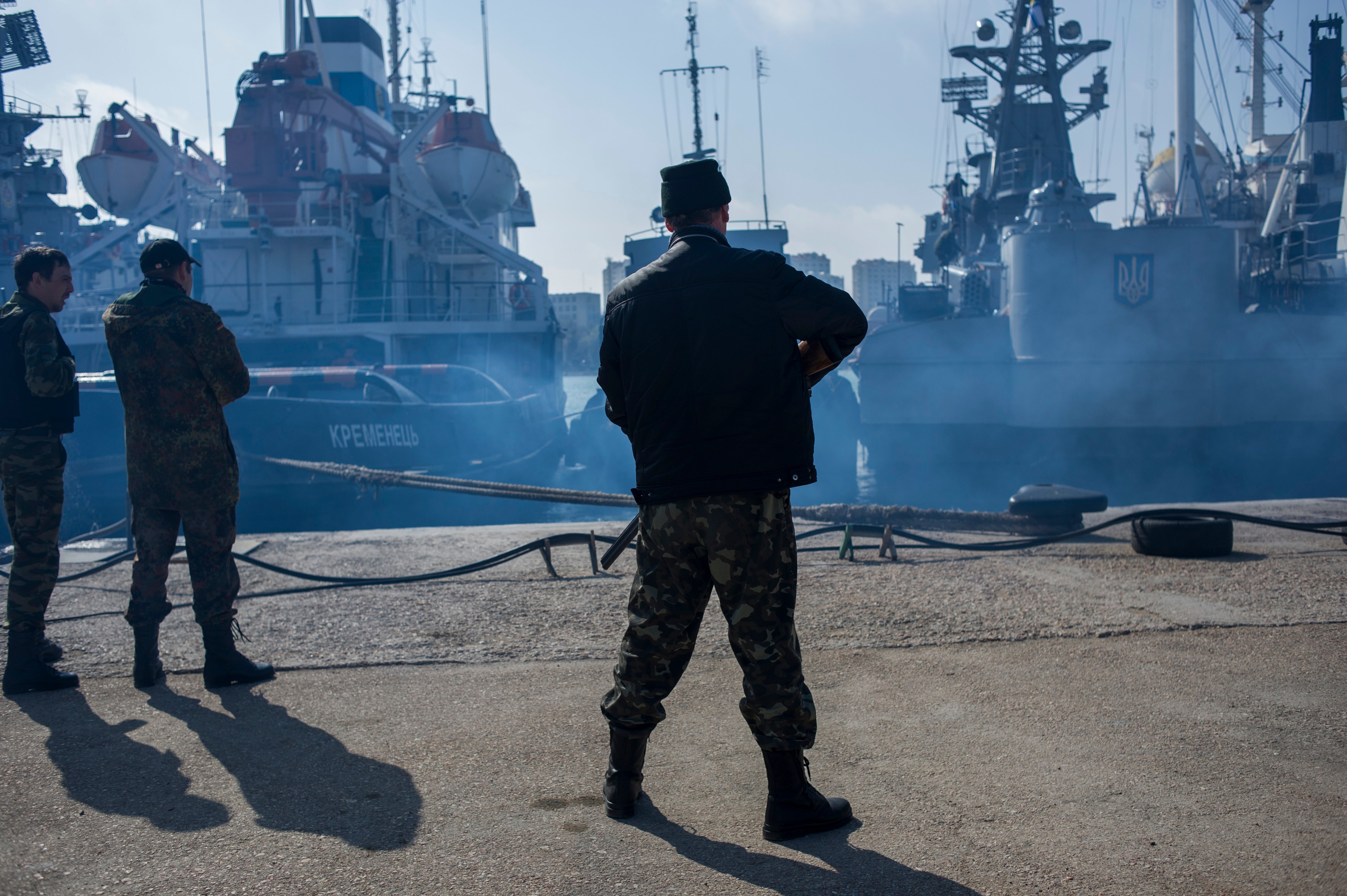Ukraine strikes warship stolen by Putin’s forces during Crimea occupation in 2014
Ukraine is said to have destroyed or damaged more than 20 Russian military ships since Moscow’s invasion began

Your support helps us to tell the story
This election is still a dead heat, according to most polls. In a fight with such wafer-thin margins, we need reporters on the ground talking to the people Trump and Harris are courting. Your support allows us to keep sending journalists to the story.
The Independent is trusted by 27 million Americans from across the entire political spectrum every month. Unlike many other quality news outlets, we choose not to lock you out of our reporting and analysis with paywalls. But quality journalism must still be paid for.
Help us keep bring these critical stories to light. Your support makes all the difference.
Ukraine has hit four Russian military ships in occupied Crimea, including one stolen from the Ukrainian navy in 2014, as it escalates its missile campaign against Vladimir Putin’s prized Black Sea Fleet.
Ukrainian navy spokesperson Dmytro Pletenchuk claimed a Ukrainian-made Neptune cruise missile hit the 113 metre-long “Konstantin Olshansky” landing ship that Russia captured from Ukraine after the illegal annexation of Crimea at the start of 2014.
“This ship was supposed to be used by Ukraine. That’s why it was decided to destroy this unit with our Neptune,” Mr Pletenchuk said, adding that it had been sitting in the Crimea port of Sevastopol waiting to be stripped for parts. “It was being prepared for use against Ukraine... so unfortunately the decision was taken to strike this [ship].”
The spokesperson also claimed that three other ships, the large landing ships “Azov" and “Yamal”, and the reconnaissance ship “Ivan Khurs”, were also damaged in the attack. The strike was already known, but Ukraine previously said it had only hit the Azov and Yamal.
Satellite imagery of Pivdenna Bay in Sevastopol suggested that at least the “Ivan Khurs” had been damaged, while images of the other ships remained inconclusive.
Though Ukraine has virtually no navy of its own, more than a third of Putin’s prized Black Sea Fleet originally stationed in Crimea have been damaged or destroyed since Russia started its full-scale invasion in February 2022. While Russia appears to have retaken the initiative on the frontline on mainland Ukraine, taking several towns over the past six weeks in the eastern Donetsk region, Kyiv’s long-range assault has remained a key area of success.
The most notorious of Ukraine’s strikes was the destruction of Russia’s flagship Moskva guided missile cruiser in April 2022. Last summer, after several long-range Ukrainian attacks, inlcuding on the Black Sea Fleet’s headquarters, dozens of Russia’s ships were forced to relocate more than a hundreds miles east of Crimea to the port of Novorossiysk on mainland Russia to mitigate against the threat.
While the “Konstantin Olshansky” was not in active service when it was hit earlier this week, it was nonetheless hailed as a significant victory for Ukraine because it was formerly part of the Ukrainian navy.
It was one of the few ships that Russia seized and did not return or sink after having annexed the territory and kicked out the Ukrainian Navy.
“10 years have passed, but justice has been restored,” wrote the Ukrainian Ministry of Defence. “The russian Black Sea Fleet is suffering in temporarily occupied Crimea. Ukraine will win!”
Andrii Ryzhenko, a former officer in the Ukrainian Navy, said the ship was never operationalised by Russia but was set to be stripped for parts to be used to refurbish the Russian “Olenegorsky Gornyak” and “Minsk” Ropucha-class landing ships, which were destroyed by Ukrainian attacks in August and September respectively last year.

There has been no comment from Russia’s Ministry of Defence (MoD) but Sevastopol governor Mikhail Razvozhayev wrote on his Telegram channel on 24 March that there had been the “most massive attack in recent times”.
Ukraine, meanwhile, said it shot down 12 more drones on Tuesday morning, some of which were fired from occupied Crimea. They claimed that all drones had been shot down.
It came as Russia’s prosecutor general called for strategic enterprises to be supplied with anti-drone defences, state news agency Tass reported.
Ukraine has in recent months stepped up drone strikes against Russian economic targets, including against at least nine oil refineries this year.
Inflation is running at nearly twice the central bank’s four per cent target and pressure on fuel prices has been exacerbated by the Ukrainian attacks.
In Kyiv, President Volodymyr Zelensky also replaced his security council secretary Oleksiy Danilov as part of a continuing shake-up of Ukraine’s top leadership.
Mr Danilov, who has held the post of head of Ukraine’s National Security and Defence Council since October 2019, only a few months after Mr Zelensky assumed office, was replaced by foreign intelligence service chief Oleksandr Lytvynenko.
The move comes a month after Mr Zelensky removed Ukraine's top military general Valery Zaluzhny, who is set to become the next ambassador to the UK.
No reason was given for this latest change to Ukraine's National Security and Defence Council, which has a coordinating role on issues of national security and defence under the president. It comprises the country's top political, security and defence chiefs.
Mr Lytvynenko was head of the foreign intelligence services from June 2021. According to the president's website, he will be replaced by Oleh Ivashchenko. The lieutenant general previously held the position of deputy head of Ukraine's military intelligence agency.
Subscribe to Independent Premium to bookmark this article
Want to bookmark your favourite articles and stories to read or reference later? Start your Independent Premium subscription today.
Join our commenting forum
Join thought-provoking conversations, follow other Independent readers and see their replies
Comments